Entertainers find new ways to pay the bills
- Published
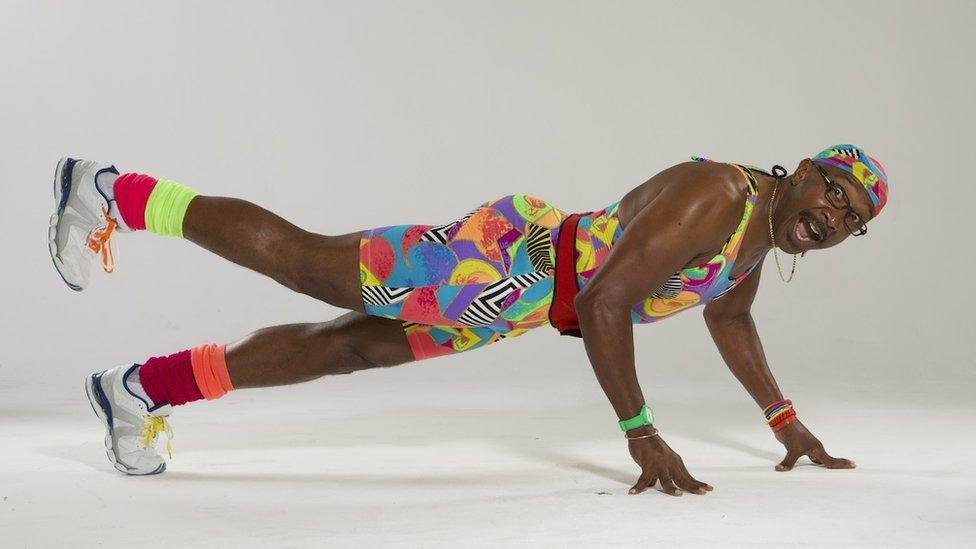
Mr Motivator says he's never been busier
Like many celebrities fitness instructor Derrick Evans, better known as Mr Motivator, saw his work schedule fall apart when the coronavirus lockdown hit the UK.
"In March everything got cancelled," he says. "Sales conferences - where I'm brought in at 1:30pm when everyone's had too much to eat and drink and my job is to make people feel good and important - all got cancelled, as did 14 festivals I was due at." But, ever the optimist, he says he "believed new opportunities would come along."
And so they did, with Evans, 68, admitting "he's never been busier". There have been appearances on BBC One, donation-led exercise classes several times a week on Zoom, while companies such as Google have booked him in for morale-boosting talks and exercise sessions through the video channel.
But there's another way he is carving out his time, and that is through making personalised video messages for his fans via video platform Hidols, which launched in July and has snooker player John Virgo and actress Linda Lusardi on its books. He charges £30 for a 30-second video, although he says it's often for longer.
"I don't charge what others charge," he says. "It's not that critical. I want to make people feel good. That's been the driver."
He won't reveal how many requests or bookings he has received but says it's "quite a few" a month.
Embracing the task, he says he likes to devote time and energy to them.
"I edit them, put music on them, add a little message. I just did a shout-out to a gym opening, someone celebrating their 60th, someone 100 years old. It's lovely. People want cheering and motivating."
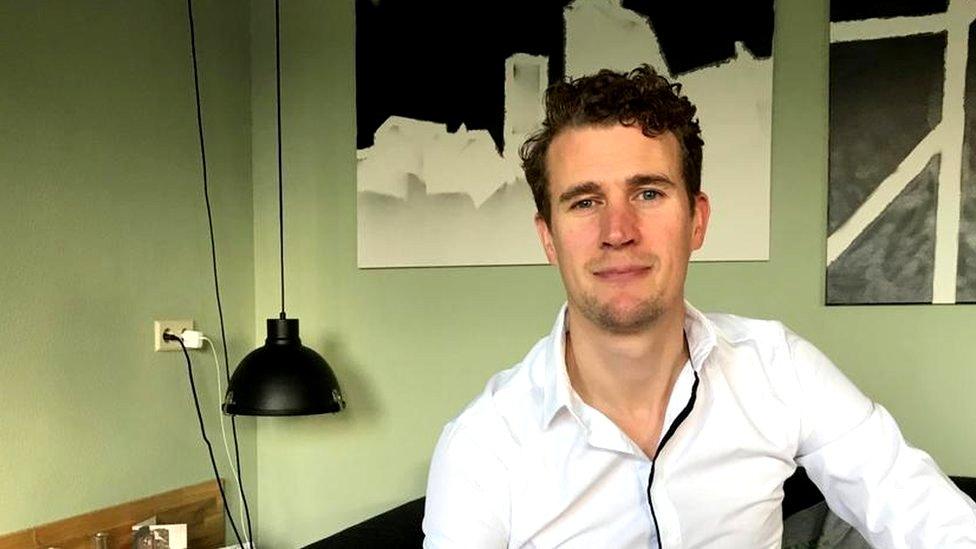
Christian Ayerst says services like Hidols help celebrities connect with fans
With many of their usual avenues closed, in the UK alone the live music industry is set to see revenues this year fall by 81%, and celebrities are turning to online to make ends meet.
"For celebrities [sending video messages] is a way to supplement their income," says Christian Ayerst, chief executive and co-founder of Hidols. "They can earn £10,000 a year-plus by doing 40 a month." But there are other benefits, he says. "It's a genuine chance to interact with fans."
The most popular celebrity shout-out service is US-based Cameo, which launched in 2016 and counts Snoop Dogg, Chaka Khan and Lennox Lewis among its celebs.
While the average cost of a video is $60 (£45), the most expensive is former athlete and reality TV star Caitlyn Jenner, who will provide a tailored video message for a cool $2,500 (£1,875).

Cameo clients include Ice-T (left), Bethenny Frankel and Snoop Dogg


"We have tens of thousands of celebs on the platform," says Cameo co-founder Martin Blencowe.
"All we're trying to do is find someone's favourite person. We have all gone through tough times and it's a way to add a bit of magic to the day."
Coronavirus led to an upsurge in celebs joining the platform. "Participation blew up because now movies are cancelled, TV shows and gigs are cancelled, concerts are cancelled," he says.
"They're looking for a new revenue stream. They're doing it for part entertainment, part business. It's a great way to connect [with fans]. We saw over 1,000% growth [over lockdown]."
New celebs who joined included actors Tom Hopper, John Cleese and Dick Van Dyke.
Celebs set their own price and sometimes adjust to meet demand. Cameo takes a 25% cut.
Entertainers with their own channels have an advantage.
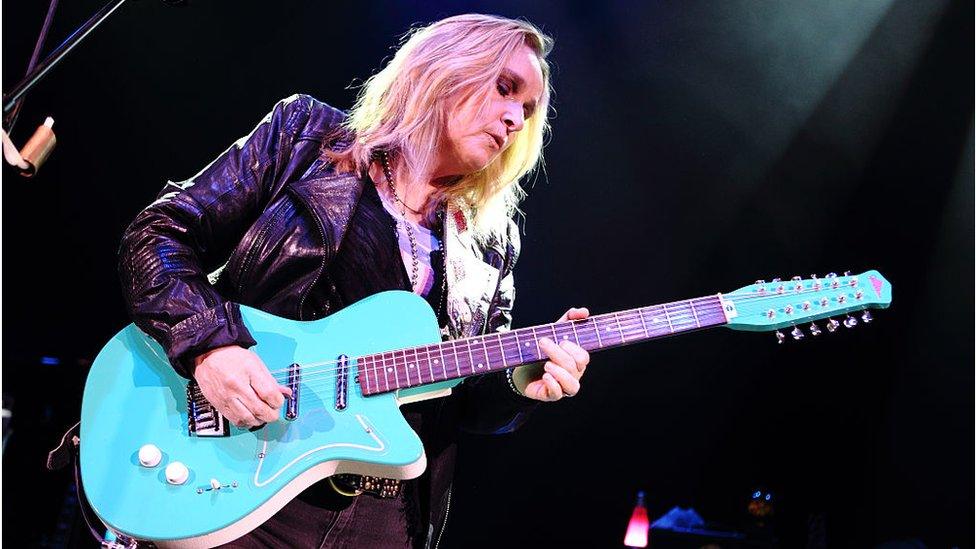
Like many entertainers, singer Melissa Etheridge has switched to streaming
Singer Melissa Etheridge is bringing in over $50,000 a month through a subscription business where she puts on five shows per week through her online channel Etheridge TV. Set up via video-streaming platform Maestro in June, she says more than 1,000 subscribers have signed up to pay $50 a month for access.
"I was looking at a year-and-a-half of no income so I decided to do my best with streaming," says the 59-year-old, who is based in Los Angeles. "I had to learn everything about streaming, the internet, sound, lighting. Some days the internet gods are with us, some days nope, they boot us off.
"It's helped us heal and grow and stay connected, and pays the bills."
Although set up in 2015, it wasn't until Covid-19 that Maestro set its sights on the music industry.
Founder Ari Evans says that as well as bringing in extra money, it can also generate extra information about fans for the artist and their record label.
"With the data we hand to them, artists are able to know so many things, such as how did this audience interact during the live stream? What parts of the stream did they like the most? Once you know that you can start to optimise further events, and key measurements like watch time, retention and revenue. This is what artists need to know," says Evans.
"We like to think of it like a real-time focus group. No longer do they have to hand off this data to the likes of Facebook and Twitch in exchange for hearts and likes. They own the show."
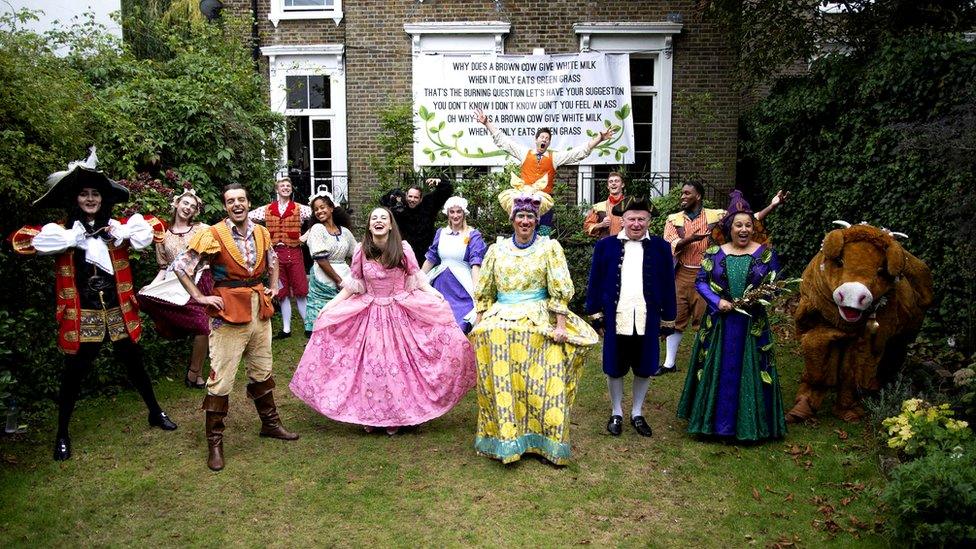
The cast of Jack and the Beanstalk in Peter Duncan's back garden
Not to miss out on the Christmas season, some pantos are turning online this season.
Former Blue Peter presenter Peter Duncan is launching an online version of Jack and the Beanstalk after setting up a production crew to film the show in his back garden in London for four weeks. It will be streamed on a dedicated website, Panto Online, from 4 December.
"Though lockdown is the worst thing in the world it does make you proactive," says Duncan. "Panto is about joy and fun and offering a positive approach amid all the doom and gloom. The beauty of online is we're not playing in one place and meaning more people can watch across the world."
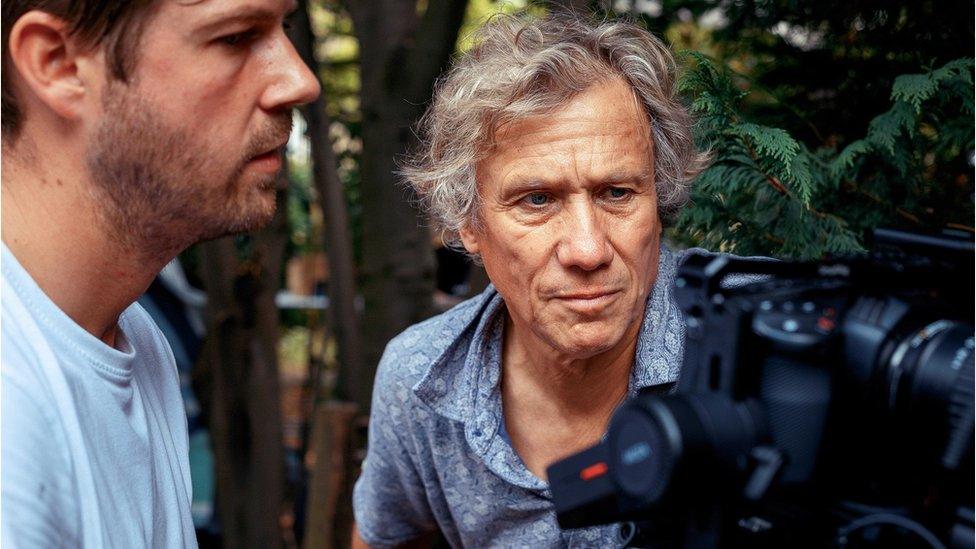
Peter Duncan (right) with his director's hat on checking video footage with cameraman Luke Roberts
Chris Rojek, professor of sociology at City University, London, and author of a book on the cult of celebrity, says over the last 50 years distance between celebrities and people has diminished considerably.
"The Hollywood system used to be remoteness with the stars far above you and look up at them in awe. Social media means it's now really much more accessible."
But he's not a fan of the celebrity messages. "What a waste of money," he says.